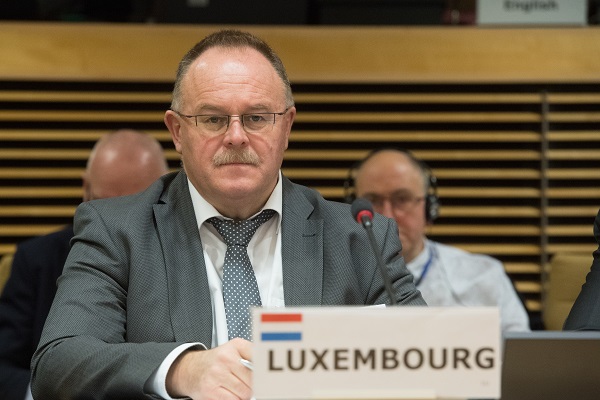 Minister Romain Schneider;
Credit: European Union
Minister Romain Schneider;
Credit: European Union
On Monday 28 January 2019, Luxembourg's Minister of Agriculture, Viticulture and Rural Development, Romain Schneider, participated in the EU Council of "Agriculture and Fisheries" Ministers in Brussels.
The Council session began with the presentation of the work programme of the Romanian Presidency, whose priorities will be the negotiations on the Common Agricultural Policy for the period after 2020. The Romanian Chairmanship will also put a special emphasis on research and the well-being of animals, priorities that Minister Schneider is supporting, knowing that Luxembourg government programme continues to promote research and that the Grand Duchy is among the most protective of animal rights Member States, following the adoption of a law of which the fundamentally new approach is based on the legal recognition of the dignity of animals.
A major point of this Council was nevertheless the reform of the Common Agricultural Policy (CAP) post 2020. Minister Schneider welcomed the main principles of the new performance model proposed by the Commission; however, he suggests a more realistic progressive timetable over time. The minister also spoke in favour of a simplified crisis agricultural reserve.
The ministers also exchanged views on the proposal for a regulation on the common organisation of the markets in the wine sector. In practical terms, in order to encourage more sustainable wine production, which is less dependent on plant protection products, the use of new plant varieties that are more resistant to disease could offer new prospects for Luxembourg viticulture. Minister Schneider expressed a certain openness in this context, but he stressed that the quality of Luxembourg and European wine production should be guaranteed also in the future.
The agenda followed with a policy debate on the development of plant proteins in the EU. Minister Schneider recalled that in 2017, Luxembourg has signed a joint declaration to encourage the sustainable production of soya beans and grain legumes. "Such commitment is in my government's coalition agreement. This is an alternative to imports of genetically modified soya from third countries. In my opinion, we will have to duplicate efforts to encourage these environmentally friendly and climate-friendly crops."
Finally, the EU Agriculture and Fisheries Council considered the report on the ministerial conference "Eradication of African swine fever and management of wild boar populations" which took place on 19 December in the presence of Minister Schneider. In order to prevent further spread of the virus, current prevention measures must be accompanied by a reduction in the wild boar population, careful epidemiological surveillance and increased vigilance on the movement of food for private consumption. Minister Schneider emphasised the importance of enhanced communication targeting the general public, hunters and transport professionals. "In Luxembourg, the exchange of information with all the stakeholders of the National Task Force and with the Belgian and French authorities is permanent. As a free country, we remain very vigilant" concluded Minister Schneider.








